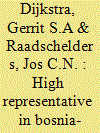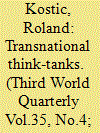| Srl | Item |
| 1 |
ID:
186386


|
|
|
|
|
| Summary/Abstract |
How difficult it is to introduce democratic institutional arrangements in a territory that had mainly experience with authoritarian government is illustrated by the case of Bosnia-Herzegovina (BH). The Dayton Peace Accord of 1995 established the (Office of the) High Representative (OHR) to help the new republic of BH develop into a democracy. After more than 25 years, one cannot but conclude that the creation of democratic institutions has not worked for lack of collaboration between the three most important ethnic groups. At best, BH is a controlled democracy, held together by OHR. The development of this office is analyzed in terms of a neo-institutional framework. We argue that the republic survives so far on the basis of negative legitimacy (accepting the OHR as the binding institutional arrangement). This also suggests that neither developments in a past long gone nor more recent developments (i.e., ‘strong’ path-dependency) prohibit a development toward positive legitimacy (i.e., ‘lean’ path-dependency). The case of BH also illustrates that democracy is hard, if not impossible, to establish when people are internally divided and where (some) domestic and international actors exploit these divisions in the international arena.
|
|
|
|
|
|
|
|
|
|
|
|
|
|
|
|
| 2 |
ID:
106777


|
|
|
|
|
| Publication |
2011.
|
| Summary/Abstract |
The Office of the High Representative (OHR) in Bosnia and Herzegovina has been mandated to guarantee that full compliance with the Dayton Peace Agreement is achieved, including respect for the essential elements of rule of law as a key condition for lasting peace. However, the power to vet, dismiss and ban public officials from public life at the OHR's discretion seems to be exercised in increasing tension with some essential due process requirements. According to the UN peacekeeping conceptual framework, this anomaly could be explained by the need for some transitional exceptions to the rule of law in conflict and post-conflict societies. Furthermore, emergency derogations are usually allowed for in all functioning international human rights systems. Nevertheless, the absence of a public and thorough revision of the harshness of some derogations, together with their connection to global economic and strategic objectives beyond the strict Dayton framework, raises suspicions about their compliance with the substantive and procedural safeguards against such exceptions required by the international human rights systems. After 13 years of exceptional rule in Bosnia and Herzegovina (BiH), could this be the time for revision? The article offers reflections on possible legal scenarios.
|
|
|
|
|
|
|
|
|
|
|
|
|
|
|
|
| 3 |
ID:
133259


|
|
|
|
|
| Publication |
2014.
|
| Summary/Abstract |
Peace-building situations can be described as battlefields of ideas where key international policy makers engage in internal battles for control over intervention policy. Knowledge production, based on timely information and analysis, is seen as crucial to winning these battles of ideas. By providing detailed information, analysis and recommendations, the International Crisis Group (icg) has assumed an important role in this process. Yet we know little about the specific role the icg plays in battles for intervention policy. This article investigates icg analyses and recommendations and the way they fit into the specific internal debates within the international community in Bosnia and Herzegovina (BiH) in 2000-01. By looking at the work of the icg in BiH around the elections in 2000, the article demonstrates that it often acted as a legitimising agent of US positions and policy in the country.
|
|
|
|
|
|
|
|
|
|
|
|
|
|
|
|